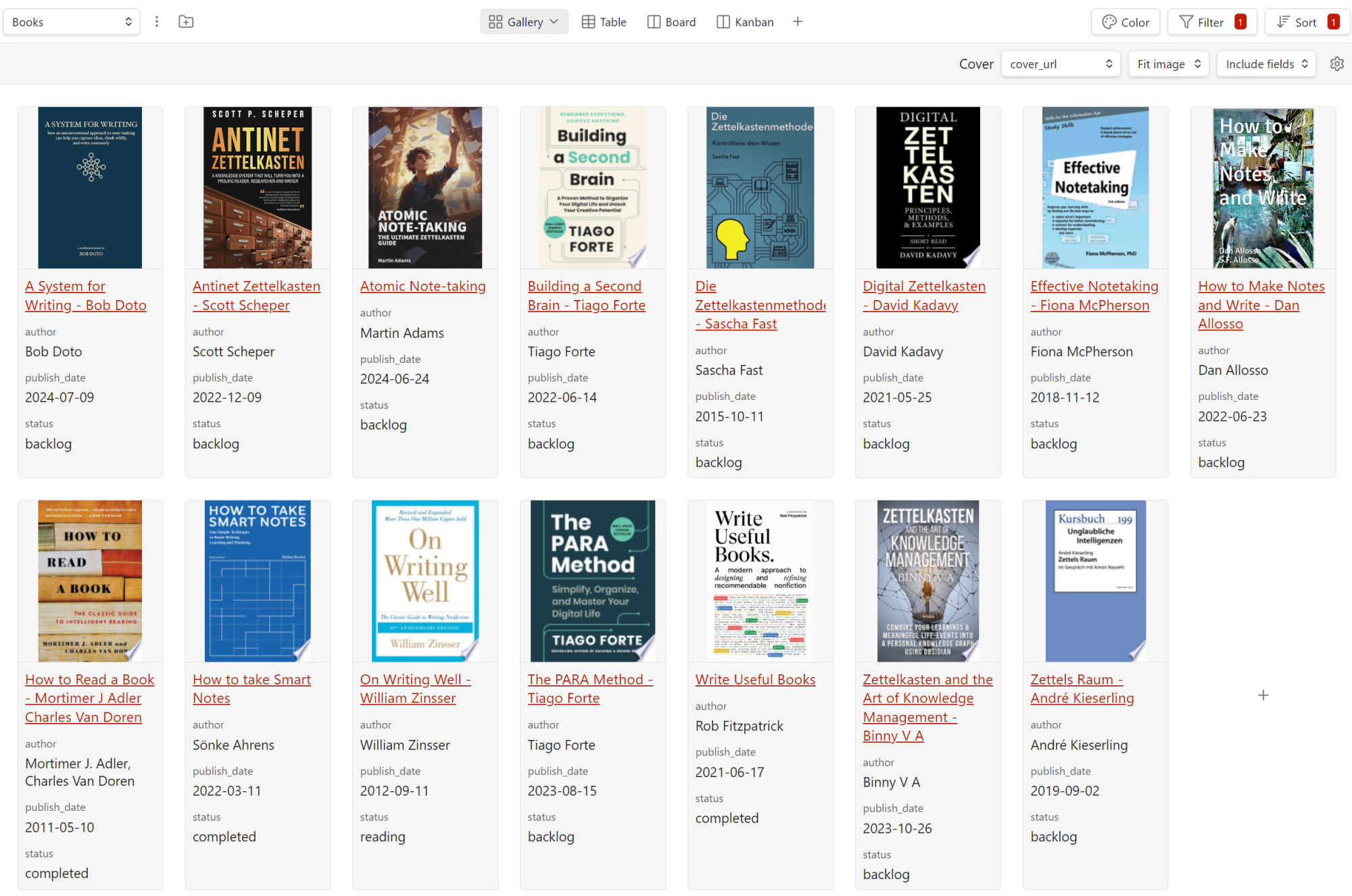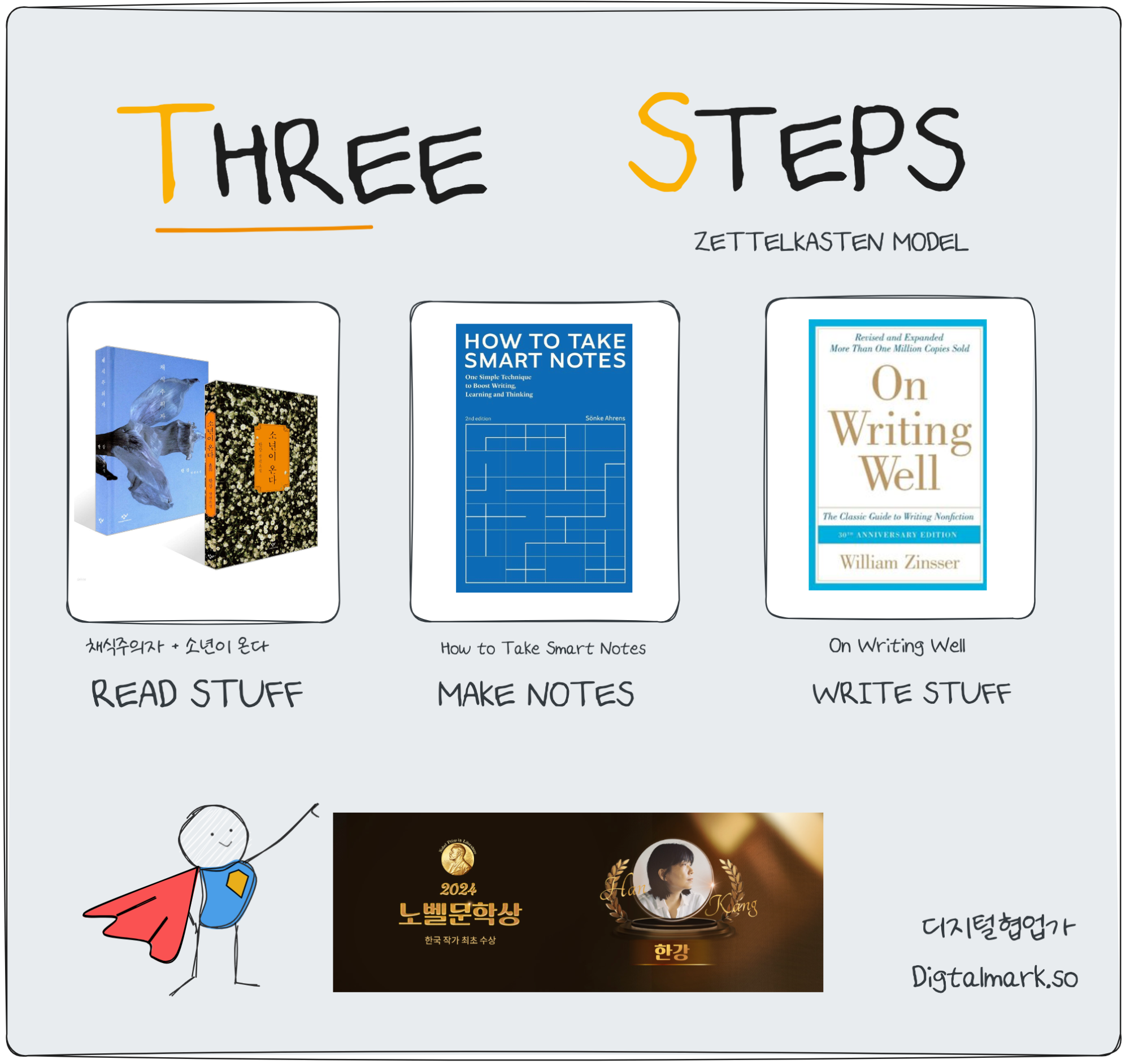What's Your "List of Three" (books to start with Zettelkasten)
This discussion was created from comments split from: Books about Personal Knowledge Management and Zettelkasten.
Howdy, Stranger!
Comments
When I ask my Zettelkasten for a list of books about Zettelkasten, it shows me more than one book:

But as you can see, most of them have a "backlog" status. Is it necessary to read all of them? I decided to shorten the list to "useful books". And here is my list of three:
How does your list of three looks like?
Edmund Gröpl — 100% organic thinking. Less than 5% AI-generated ideas.
@Edmund Challenge accepted!
🗄 My blog on substack
I love it. 😀👍 But which book to read first?
Edmund Gröpl — 100% organic thinking. Less than 5% AI-generated ideas.
@Edmund Challenge accepted!
Will Simpson
My peak cognition is behind me. One day soon, I will read my last book, write my last note, eat my last meal, and kiss my sweetie for the last time.
My Internet Home — My Now Page
Same sequence as in the picture. I also like @Will 's picks.
🗄 My blog on substack
Edmund's question about books on the Zettelkasten has prompted a critical revision of my book collection
My favourites in these years (2023/2024) are the following three books:
Zettelwirtschaft: Markus Krajewski
repeatedly since 2002, as an overview of the methodological and technical base of Luhmann's Zettelkasten
Sönke Ahrens: The Slipbox Principle
since 2018, as a combination of the classic Zettelkasten-strategy with the potential of the personal computer.
Ivo Velitchkov: Personal Knowledge Graphs
since 2023, as an outlook on the potential of the clearer integration of notes and connections through vector systems. Gains additional importance through LLMs.
immer am Rand der Sammlerfalle
@rl911 Which chapter in Zettelwirtschaft do you feel has the best overview of the " methodological and technical base of Luhmann's Zettelkasten"? The English translation of the book, Paper Machines , does not go into any detail about Luhmann's specific methods.
@JasperMcFly Luhmann's Zettelkasten itself is not the subject of the
book but the predecessors. The chapter "Box/Thinking" p. 64ff (Kasten/Denken) offers a brief overview from Gassner 1548 to the new storage systems of the 19th century. The term "basis" refers to the predecessors of Luhmann Zettelkasten. Luhmann, a lawyer, initially used the "scholarly machines" (Gelehrtenmaschinen) of writers and the index card systems of bureaucrats for his job in administration and later for the development of his systems theory.
immer am Rand der Sammlerfalle
Ok, thank you for your reply. I am a big fan of Krajewski's writing. Just wanted to make sure the English translation was not missing something. Thank you.
Bob Doto's book, newly available on Amazon, is probably the most straightforward book I've read. The examples are very helpful. Here is the reference (note: no links--no one can accuse me of affiliate marketing):
Doto, Bob. A System for Writing: How an Unconventional Approach to Note-Making Can Help You Capture Ideas, Think Wildly, and Write Constantly - A Zettelkasten Primer.
Johannes Schmidt's research papers are excellent, though they aren't books.
Ivo Velitchkov's book is a dreary mixed bag that recasts old ideas as if they were new. In place of that, there's the old, reliable "How to take smart notes," by Sonke Ahrens, which Bob Doto's book makes obsolete.
GitHub. Erdős #2. Problems worthy of attack / prove their worth by hitting back. -- Piet Hein. Alter ego: Erel Dogg (not the first). CC BY-SA 4.0.
One book and two papers:
And of course the real deal, Luhmann's original Zettelkasten, starting at ZK II Zettel 9/8.
What software are you using?
My "List of Three" books to start with Zettelkasten would be:
"How to Take Smart Notes" by Sönke Ahrens - This book is a fantastic introduction, explaining the philosophy behind Zettelkasten and how to implement it in daily life.
"Zettelwirtschaft" by Markus Krajewski - A deeper dive into Luhmann's methods, perfect for understanding the historical context.
"The Slipbox Principle" by Sönke Ahrens - It combines traditional strategies with modern tools, making it relevant for today's note-takers.
As a bonus, I recommend exploring online communities and discussions to see how others apply these concepts in their own Zettelkastens. Engaging with fellow learners can provide valuable insights and motivation!
https://remontowanie.waw.pl
These convinced me to try Zettelkasten:
These served as starting points:
Not really a book, but a wonderful example Zettelkasten (timestamp-like IDs, structure note, tags) that dovetailed well with the books:
https://github.com/Zettelkasten-Method/The-Archive-Demo-Notes 5/5.
The first image was created with the Projects plugin for Obsidian. - https://github.com/marcusolsson/obsidian-projects . The second one with Concepts App on iPad Pro.
Which tools are you using?
Edmund Gröpl — 100% organic thinking. Less than 5% AI-generated ideas.
+1 for Bob Doto’s book. Got it recently and it’s been very helpful.
The first image. Thank you.
@Edmund Challenge accepted!

The first Nobel Prize in literature was awarded to South Korea.
To share the good news, we're starting phase 3 with a book by Han Kang.